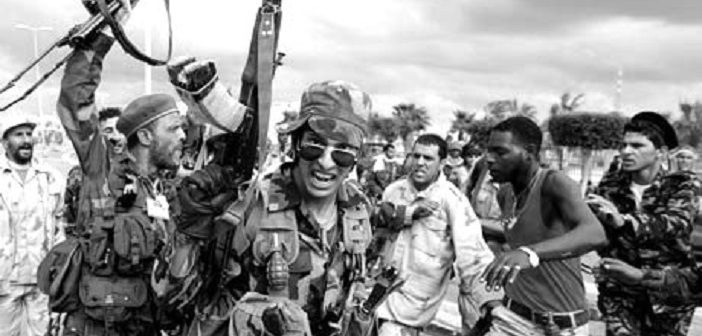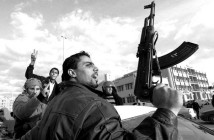On December 17, 2015, the UN-brokered “Libya Political Agreement” (LPA) was signed in Skhirat, Morocco. The three key bodies of the agreement are the “House of Representatives” (HoR, the continuation of the internationally recognized parliament, elected on June 25, 2014), the “State Council” (SC, an advisory body, comprising 145 former members of the General National Congress, GNC, Libya’s first interim parliament, which was replaced by the HoR), and the “Presidency Council” (PC), consisting of nine members and carrying out the function of Head of State.
Fayez al-Serraj, strongly supported by that-time UN Special Representative (SR) and Head of “United Nations Support Mission in Libya” (UNSMIL), Bernardino Leon, was nominated Chairman of the PC on October 9, 2015, several weeks before the signing of the LPA. The Chairman of the PC is also the Prime Minister of Libya and as such the head of the “Government of National Accord” (GNA).
The presidents of the HoR, Agheela Saleh, and of the SC, Abdulrahman Sewehli, one of the most influential Misrata politicians, are on odds ever since. While Saleh tries to limit or even prevent the influence of all Islamists on Libyan politics, Shweli himself is Islamist-leaning.
Martin Kobler, current UN SR and Head of UNSMIL (as of 4 November 2015) urged Serraj to move with the PC to Tripoli as soon as possible. After several security arrangements with militias in Tripoli were agreed, Serraj arrived in Libya’s capital on March 30, 2016 on board of a ship of the Libyan Navy.
Since this time Serraj struggles on several major frontlines. He still requires getting his GNA endorsed by the HoR, as foreseen in the LPA, needs to assert his authority in and beyond the capital, establish security, and get the economy up and running.
The HoR rejected Serraj’s proposed governments twice, at first in January 2016, and – after almost endless delays – in August 2016 for the second time. The situation is currently in a stalemate.
Western position and media reporting
Western countries frequently blame the HoR, Field Marshall Khalifa Haftar, the contested Commander of the Libyan National Army (LNA), and Libya’s controversial Grand Mufti, Sheikh Sadeq Al-Gharyani for the situation, but this is a little bit superficial and does not address the real causes for Serraj and the GNA ending in a dead-end road.
Analysis of the situation on the ground
From a legal point of view – based on the content of the LPA – the GNA is not in charge yet, as it needs the endorsement of the HoR. The SC has no mandate whatsoever to act as the legislative body of Libya. This means regardless of the international recognition of the GNA, if there is a legal government of Libya, it is still Al-Thinni’s HoR approved cabinet.
The situation on the ground is very complicated.
Serraj’s government in Tripoli is fully dependent on the goodwill of the militias, some of them Islamist. It is protected by a newly established “Presidential Guard”, consisting at the core of former militia members from Misrata. On the other side, several other armed groups in the capital want to evict the Misrata from Tripoli entirely. Some of them consider the Presidential Guard merely another Misrata militia.
These circumstances are also a major reason why the LPA itself was only in part ratified by the HoR. Many delegates have concerns about the appointment of the Commander of the LNA by a government which is perceived to be controlled by local Tripolitanian militias and Islamists.
Misrata businessman Ahmed Maitiq is the PC’s vice-chairman. For quite a few he is a puppet in the hands of Abdulrahman Sewehli and the Muslim Brotherhood. However, his own influence on the militias of his hometown is quite limited.
Although the security situation in Tripoli is relatively calm, crime and fighting between militias are huge problems. Abductions and armed robberies take place on a daily basis, while there is an on and off of militia fighting for control of quarters of the city. The GNA stands helpless on the sideline.
Sustained power cuts, an ongoing cash crisis and the low value of the Libyan Dinar are only a few symptoms of an entirely rotten economy. Although a higher income from oil exports is certainly beneficial, this will not solve the crisis.
In contrary to what is widely propagated by western media and Martin Kobler, Serraj is in Libya widely seen as choice of Bernardino Leon, whose reputation has been severely damaged by a scandal about his very personal links to the United Arab Emirates. As Serraj was not able yet to deliver any significant tangible progress, even his support by the population of Tripoli is fading away.
The (admirable) fight against IS in Sirte is not an effort by the GNA, although it is frequently celebrated by the West as a first success of the internationally supported government. Brave young men from Misrata take the brunt of the fighting and the vast majority of the casualties.
There are only a few fighters from other cities and the GNA is providing close to no support. But this is not so much because of a lack of will, but more a lack of capacity. Consequently, the leadership of “Operation Al-Bunyan Al-Marsoos” (“Solid Foundation”), which was triggered when an IS offensive in early May came as close as 70 km to Misrata and interrupted the vital road to the Al Jufra Oasis, reports back to the military authorities of Misrata and not to Al-Mahdi Al-Barghati, the Defence Minister of the GNA.
The fight of the LNA in Benghazi against the Islamist “Benghazi Revolutionary Shura Council” (BRSC) and allied fighters from the Islamic State is far from over. Although most parts of the city are more or less under control of Haftar’s troops, a lack of forces, in particular of well-trained infantry, doesn’t make a defeat of the Islamists realistic any time soon.
Neither Serraj nor Al-Thinni have a real influence in the southern parts of Libya.
In early September General Haftar launched a successful offensive to take the oil terminals in the eastern Gulf of Sidra from Ibrahim Jadhran’s “Petroleum Facility Guards”, who had occupied them and tried to blackmail Libyan governments with the closure of the ports since late 2013. Jadhran, who had initially claimed to be a federalist, defended the harbors against the Misrata last year, but declared recently his support for the GNA, actually his only option after falling out with Haftar.
There is little doubt that Misrata would have tried again to seize these terminals after the fall of Sirte and the consolidation of its forces. Neither the LNA, nor the HoR, nor the local Magharba tribe have an interest whatsoever that a western Libyan military power occupies the harbors. One could say that the LNA consolidated its territory to ensure control over its resources, before losing them to Misrata.
The influence of Khalifa Haftar, recently promoted to Field Marshall, is frequently exaggerated. Although there is no doubt that he is still very powerful, he has his limits and is not irreplaceable for the East or the LNA. Originating from the Firjan, a noble, but less important smaller tribe, Haftar is aware that his position relies on the support of eastern tribal leaders and the military establishment. On several occasions he needed to revise decisions under pressure from tribal elders.
Haftar has been the major unifying element within a ragtag Libyan National Army, but he is probably not uncontested any more. There are frictions and fault lines, in particular with regard to the position of the LNA towards the GNA and its defense minister, Mahdi Al-Barghathi, former commander of an LNA tank brigade, and the LNA’s strategy and objectives after the currently still ongoing, very bloody Battle of Benghazi against various Islamist groups. However, Haftar was able to improve his standing significantly with the recent successful seizing of the oil terminals and the subsequent beginning oil exports.
Libya’s Grand Mufti Sadeq al-Ghariani is a Tripoli based Salafist, who is not only an archenemy of Khalifa Haftar, but also rejected the GNA on several occasions. He frequently called Haftar a more important enemy than the Islamic State and praised radical Islamist fighters like Ansar al-Sharia, although they were designated as “terrorists”by the United Nations.
Probable Intentions
Fayez al-Serraj will heavily rely on the international support for his political survival further on. He will try to foster his position in Tripoli to get at least a hold on the capital while trying to get the endorsement of the HoR for his government. The Presidential Guard will play a key role with regard to physical security of Serraj, the PC and the GNA.
Tripoli’s major militias will keep their pressure on the GNA to ensure that there are no major political decisions against their will. Each of the larger militias and the various “militia blocks” will try to extend their influence on the ground to control as much territory as possible. Some more bloody fighting between them can be expected, in particular about the more prominent buildings, governmental facilities and specific districts.
The fight against IS costs Misrata a very high toll in wounded and deaths. After having defeated IS in Sirte, Misrata will redeploy a significant number of troops to Tripoli in order to ensure its influence and to keep the GNA in power. Although the city still has one of the largest single military forces of the country, its capabilities are severely overstretched. Troops from Misrata are deployed in Sebha, to protect oil facilities in Fezzan, in Jufra, Tripoli, and – of course – Sirte. For the time being there are no capabilities to launch a larger offensive to take the oil terminals and fields in the eastern Sirte. However, some harassment by raiding parties from Misrata and allied militias like the Islamist “Defend Benghazi Brigade” (DBB) is very likely.
The HoR leadership will further on reject the GNA.
Field Marshal Haftar will try to consolidate the area under his control before trying to expand his influence towards Fezzan. As Haftar is certainly aware, a military offensive from the Cyrenaica towards Tripoli has no chance for success.
The Islamic State will try to consolidate after the Battle of Sirte and attack oil producing facilities in the Sirte Basin and in Fezzan.
None of the major players has the capability or the serious intention to take on human trafficking. This would just cost a lot of resources and open frontlines with new enemies without contributing to the respective aims.
*
* *
There are many good reasons for the HoR not to approve the GNA. This is not a personal issue of a few individuals like Haftar and the Mufti, but a very complex situation. The current circumstances in Tripoli are fostering the conviction of many Easterners that the Cyrenaica must not be ruled from Tripolitania, let alone by a government dependent on Tripoli and Misrata militias.
But even if Serraj’s next proposed government would be endorsed by the HoR, this would not solve the underlying problems. The inability of the government to impose its will and retain the monopoly on violence, the rising influence of radical Islamists, the legacy of the chaotic administration of the state under the Gaddafi regime and the numerous century-old tribal conflicts in several parts of the country are not solved by an endorsement of the GNA by the HoR.
It is even doubtful that this would be the right first step to a stabilization of Libya.





1 Comment
Pingback: LIBYA – Haftar and the Mufti, causes of a...